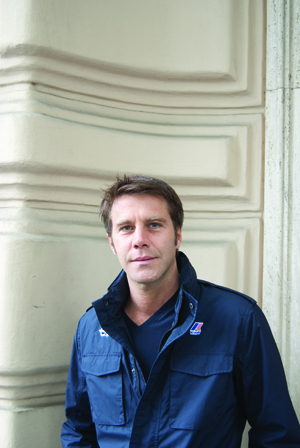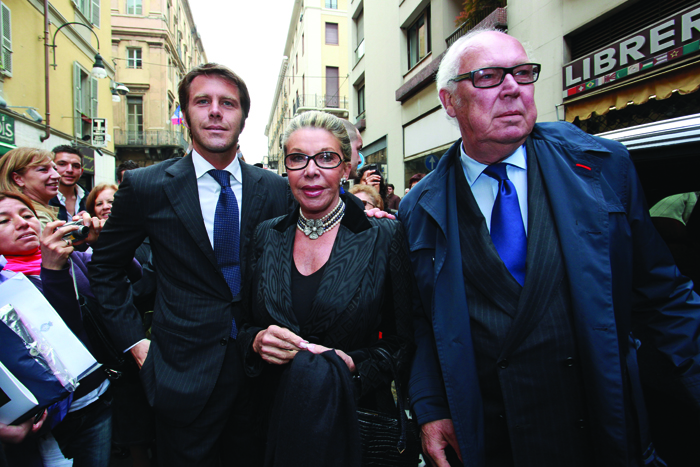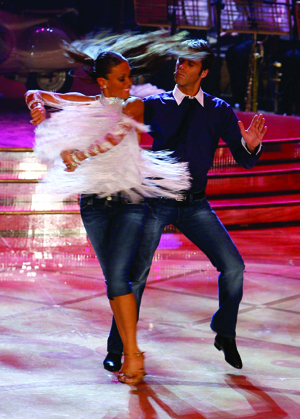 James Miller is granted an audience with the heir to what would have been the Italian throne, a man who grew up in exile and is now an Italian personality. Read the full interview with the Crown Prince of Italy here…
James Miller is granted an audience with the heir to what would have been the Italian throne, a man who grew up in exile and is now an Italian personality. Read the full interview with the Crown Prince of Italy here…
We are sitting and waiting in the grand lobby of the Hotel Regina Baglioni, in Rome’s glamorous via Veneto, composing ourselves for the ensuing occasion. Via Veneto is famous for epitomising the Eternal City’s dolce vita era. The hotel lobby was resplendent with a tiled floor so polished it perfectly reflected the illumination from the overhanging Murano glass chandeliers. The hotel had direct links to Italy’s former Queen Margherita. A fitting location I thought to meet Queen Margherita’s charismatic grandson, the Crown Prince of Italy, his Royal Highness Emanuele Filiberto.
The Prince is the son of an ancient European dynasty, the House of Savoy. The family’s history is a fascinating tale of European royalty. During the Middle Ages, the Savoys initially secured large territory in the western Alps, which is now at the border of France, Italy and Switzerland. The House was elevated to ducal status under the Holy Roman Empire in the 15th century. One of the family’s most significant contributions to Italian history is the unification of the country. This completed the family’s ascension in the mid-19th century when they became the ruling house of Italy. They maintained their tenure right up until the founding of the Italian Republic in 1946.
During my time as a correspondent for Italia! I have met and interviewed numerous members of the Italian nobility, as well as Italy’s most celebrated show business luminaries, though meeting Italy’s Crown Prince represented something of an apex in my writing career. As a Brit it was unthinkable to fail any standards of protocol and decorum commensurate with meeting a member of Italian royalty. I had dressed formally for the occasion and was now sat in ridged anticipation. I then heard a commotion at the concierge’s desk – through the staff’s excited chatter a deep, distinctively polished but eminently friendly voice resonated through the lobby. The hotel’s staff were being engaged like old friends by His Royal Highness Prince Emanuele Filiberto.
He walked over and greeted me with a disarming smile and offered me a coffee. It was obvious that this Prince doesn’t permit his guests to be standing upon ceremony. We proceeded to the hotel’s café, the Baglioni, a sumptuous and grand room with panelled walls bedecked with Renaissance paintings. The splendour of the hotel’s regal theme was today complemented by the presence of a royal patron in attendance, though somehow the hotel’s backdrop was at odds with the relaxed and charismatic Prince sat in the corner. The Prince’s attire was casual, dressed in jeans and sneakers. To him this seemed to be more of a social occasion.
I asked the Prince what it was like when he first learned of his family’s royal origins and what this meant to him. He recounted the bitter sweet recollection of that experience when he was around seven years of age. At the time, his youthful interest was tinged with sadness as the realisation that his family’s special status was accompanied by the knowledge of their exile from their beloved Italy. He found this particularly hard as he always felt truly Italian. In typical Italian playfulness the Prince compared it to a child being on a diet but living next to an incredible chocolate shop. Though he was careful to point out that despite the pain of not being able to experience Italy’s wonderful culture, his exile was by no means an uncomfortable experience. He was raised in a beautiful house and was privileged with an excellent education, though at the time he couldn’t understand why he was being punished for events that took place before he was born.

I asked what it felt like to step foot on Italian soil for the first time in 2002 once the exile was over. The Prince looked distant and reflective for a moment and then with a broad grin he exclaimed that it was wonderful. He went on to express his appreciation for the media opportunities that enabled him to connect with the Italian people. The Prince’s first media appearance was on Italy’s Strictly Come Dancing, Ballando con le stelle. He initially thought it was a risky prospect and wasn’t sure how his countrymen and women would react to him, though he was determined to give it a go. It turned out to be worth the risk as he was an immediate hit with the viewers, actually going on to win the competition. The Prince has since continued his work with the media, which he thoroughly enjoys.
He has also enjoyed success in the popular show il Principiante, in which he travels across Italy trying his hand at regular employment, some of which involves hard manual labour. Despite the Prince’s background and heritage, he possessed a grounded quality that made him incredibly easy to engage with. I could quite imagine him rolling his sleeves up and getting stuck into some hard toil, demonstrating to the Italian people that despite the fractured history between Italy and his Savoy ancestors, he was a proud Italian and, like the people watching his show, he was one of them.
The experience of il Principiante satisfies the Prince’s desire to connect with his fellow Italians and provides him with an insight and appreciation for the everyday struggles of trying to make ends meet. A common theme in the interview was the Prince’s admiration for people who endure challenges in life and maintain the fighting spirit needed to overcome adversity. The Prince is a media celebrity in Italy nowadays, however his early professional life was in finance. He had a successful career managing hedge funds in New York, though he later pursued vocations of a more noble nature. The first charity he established was the Prince of Venice Charity Fund, a cultural organisation that helps promote young artists. His passion for art was also palpable during the conversation. “Art creates dialogue between people of different backgrounds; it is the perfect way to connect people,” he explained. The Prince’s support for the arts is recognised internationally – France has awarded him honours in recognition of his contributions. He talked about his enthusiasm for arts in all their forms, from the classical masters such as Leonardo da Vinci and Michelangelo to the masters of cinema today, such as Martin Scorsese and the Italian directors Visconti and Fellini. I asked the Prince about his views of how our readers could strive to experience la dolce vita. He explained that despite la dolce vita being something of an era now romantically lost in the mists of time, he encourages people to experience life by putting 110 per cent of their passion and enthusiasm into it: “Everything and anything you want, go for it!”
This was inspirational language and it was clear that he meant it. I was keen to understand who his inspirations were. There were a number of iconic individuals the Prince mentioned, all of which made a vocation out of helping others. Mother Theresa, Francesco d’Assisi, not to mention members of his own family who were instrumental in the unification of Italy.

The Prince was clearly an energetic and passionate individual, but his first passion is of course his family. When talking about his daughters he became the picture of paternal pride. He described his thoughts and feelings about fatherhood and how he is determined to show his children a good example but not to impose his views upon them: “It is wonderful. Children are like a blank canvas. You can try to design the road that will allow them to gain their knowledge of the world.” He explained how he had taken his daughters to an orphanage in Africa to bring some Christmas cheer to under-privileged children. Recounting the time as a wonderful Christmas that everybody enjoyed, his passion for embracing all walks of life and his generosity of spirit was very apparent.
Staying on the topic of family life, I was keen to understand more about what a day in the life of Prince Emanuele Filiberto was actually like. The Prince looked amused by the question and I could detect a certain embarrassment and reticence in his answer. This was probably due to a reluctance to disappoint those labouring under misapprehensions that his life is a whirlwind of socialising in palazzi and dining in Michelin-starred restaurants every night. He described his typical routine as being that of any father and husband, spending time with his daughters, collecting them from school and cooking dinner for them.
Of course, as a public figure of media interest he does have other demands on his time that he manages much in the same way as any other working family man. This was an interesting answer, I thought, one that any family man could relate to. Although as the principal Son of Italy, I wondered how he viewed his relationship with the country. How would you like to be thought of by the Italian people I asked. There was little delay before the Prince responded to this question, it was clear that this didn’t need a pause for thought. He looked me square in the eyes and said, “Like a brother.”
As we wrapped the interview up, I considered how the Prince’s personal values personified the characteristics that inspire our interest and fascination in Italians and Italian culture. He exuded a certain sense of style and flamboyance that Italy is famed for, as well as a burning enthusiasm for creativity, culture and enjoyment of life. But the Prince’s final response represented perhaps the most famous of all Italian values, dedication to family. This heir of an ancient family, inexorably intertwined with Italy’s past, is surely one of Italy’s most passionate and enthusiastic sons of today.
